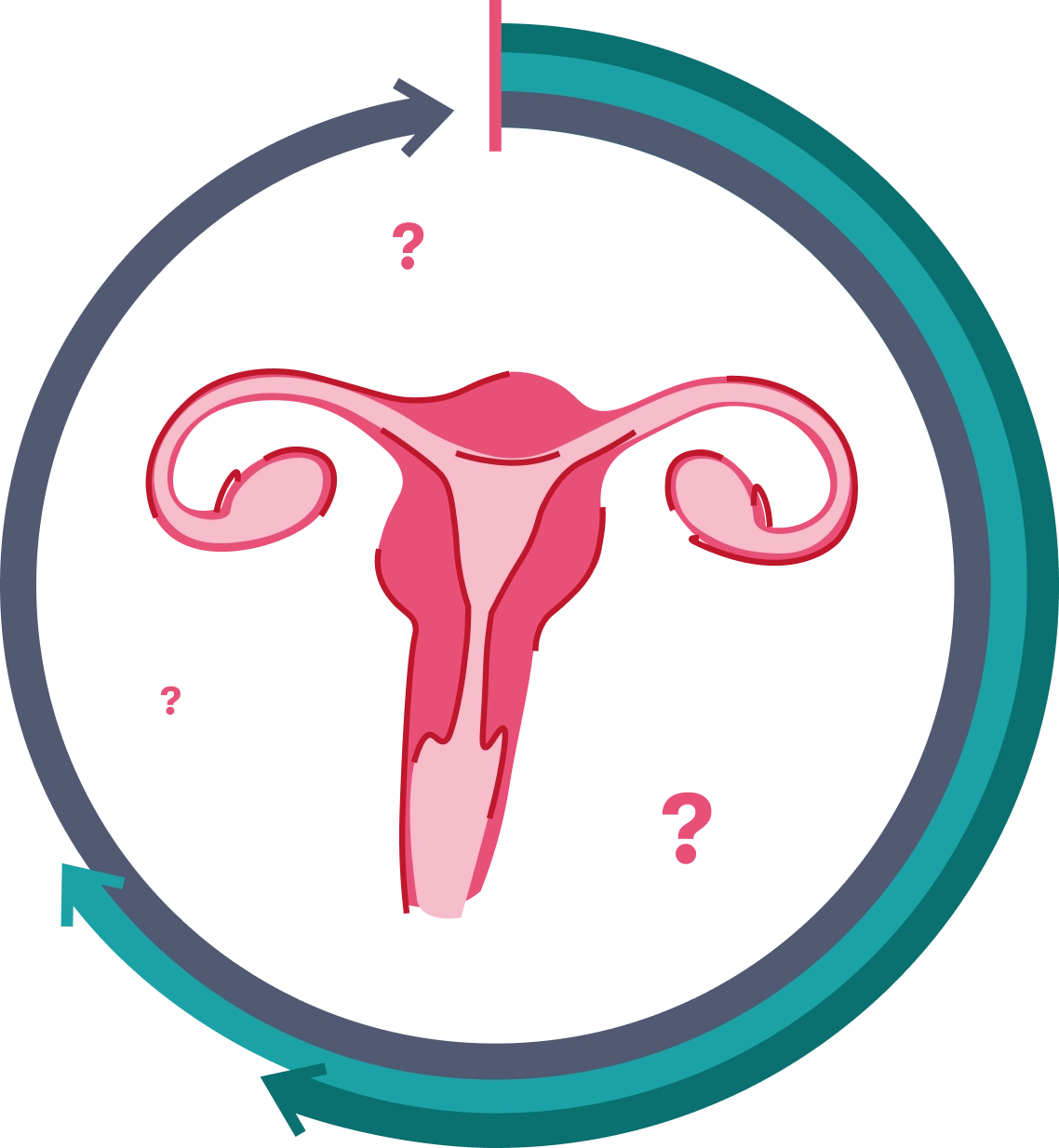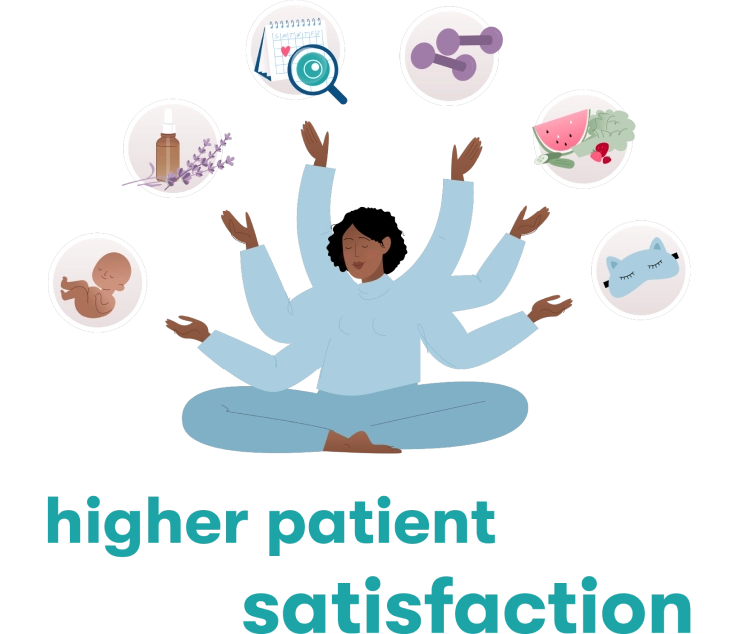What do your patients know?
Reproductive health misinformation harms the health of countless women. 1
Millions of women are facing the consequences of inadequate menstrual health education, according to Flo Health’s 2023 Reproductive Health Survey. The survey, which polled 2,010 nationally representative US women aged 18 to 55, revealed some alarming gaps in knowledge.
58%
don’t know what a “normal” menstrual cycle is. 2
63%
aged 18-24 learned more about menstrual health from social media than in school. 2
93%
cannot accurately identify all phases of the menstrual cycle. 2


This is concerning, as ACOG states that menstrual cycle changes are equally useful as abnormal blood pressure, heart rate, or respiratory rate in predicting potential health problems.3 Understanding changes early and being able to communicate them are vital.
63% of women aged 18–24 have learned more about menstrual health from social media than in school,2 probably because only 21% of elementary schools currently provide puberty education.4
1. Berkman, Nancy D., et al. “Low Health Literacy and Health Outcomes: An Updated Systematic Review.” Annals of Internal Medicine, vol. 155, no. 2, July 2011, pp. 97–107. PubMed, https://doi.org/10.7326/0003-4819-155-2-201107190-00005. 2. Flo Health’s 2023 Reproductive Health Survey. 3. Zhaunova, Liudmila, et al. "Characterization of Self-Reported Improvements in Knowledge and Health among Users of Flo Period Tracking App: Cross-Sectional Survey." JMIR MHealth and UHealth, vol. 11, no. 1, April 2023. https://doi.org/10.2196/40427. 4. Schmitt, Margaret L., et al. ‘’‘It Always Gets Pushed Aside:’ Qualitative Perspectives on Puberty and Menstruation Education in U.S.A. Schools.” Frontiers in Reproductive Health, vol. 4, 2022, https://www.frontiersin.org/articles/10.3389/frph.2022.1018217/. 5. Simpson, Cassandra N., et al. “Combating Diagnostic Delay of Endometriosis in Adolescents via Educational Awareness: A Systematic Review.” Cureus, vol. 13, no. 5. PubMed Central, https://doi.org/10.7759/cureus.15143.
Thank you for your request.

You will soon receive the Flo’s 2023
Reproductive Health Survey in your Inbox.

Patients who can’t articulate their problems take longer to treat 1

When your time is short and precious, explaining basic health information cuts down the time spent on other important conversations.
Poorly understood reproductive health information can lead to:
- Misdiagnosis of diseases and conditions 5
- Difficulty in patients communicating symptoms/issues 5
- Increased time to explain the basics of reproductive health
- Ineffective treatment plans 1
- Lack of compliance with treatment 1
Patients who lack comprehension of their menstrual cycle and fail to monitor it may delay their treatment by being unable to provide information for their medical history.
1. Berkman, Nancy D., et al. “Low Health Literacy and Health Outcomes: An Updated Systematic Review.” Annals of Internal Medicine, vol. 155, no. 2, July 2011, pp. 97–107. PubMed, https://doi.org/10.7326/0003-4819-155-2-201107190-00005.5. Simpson, Cassandra N., et al. “Combating Diagnostic Delay of Endometriosis in Adolescents via Educational Awareness: A Systematic Review.” Cureus, vol. 13, no. 5. PubMed Central, https://doi.org/10.7759/cureus.15143.
“As a practicing OB-GYN, Flo and folic acid-containing prenatal vitamins are my pregnancy-planning essentials for patients.”

Dr. Jenna Flanagan, academic generalist obstetrician and gynecologist,
Beth Israel Deaconess Medical Center, Massachusetts, US, member of Flo’s medical board

How do you fit this education in?
Opportunities to educate patients in OB-GYN appointments are limited.

OB-GYN visits serve a crucial role in the education of women and people who menstruate about reproductive health. However, a typical OB-GYN appointment lasts only 10 to 15 minutes, limiting available opportunities.
Balancing history taking, education, and treatment options in this short time can seem impossible. External resources can help supplement discussions in appointments, but with so much misinformation and non-personalized resources on the internet, choosing what to recommend can be difficult and requires effort.

Menstrual cycle-tracking apps and cycle stage-relevant educational resources can efficiently educate women and people who menstruate about reproductive health and teach them to recognize patterns that indicate a need for medical care.
Combining cycle tracking and education can help women and people who menstruate better understand their bodies, menstrual cycles, and reproductive health, improving health outcomes and patient satisfaction.
Flo has become the first period & ovulation tracker to meet world-class security standards after achieving ISO 27001 certification. Read more.

Why not get in touch?
At Flo, we’re more than just an app; we’re a community passionate about the future of healthcare. Opt in to get our newsletters, updates on Flo’s latest product developments, latest scientific research, and continuing medical education including invitations to professional events.
We promise not to give you information overload.
You can unsubscribe or change your preferences anytime via the link in our emails.